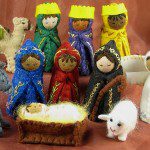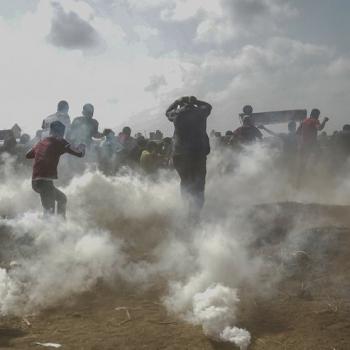Sermon preached at Burke UMC, 12/31/11 & 1/1/12
Text: Isaiah 61:10-62:3
So what do we do now? It’s the post-Christmas letdown. On the one hand, there’s a fairly obvious answer to this question because there’s a deadline for getting your tree down and out to the curb if you want the bulk trash people to pick it up. My family has a little leeway since we use an artificial tree. We like to rebel against the abrupt ending of Christmas, which we do by keeping our tree and lights up at least a few weeks into January. But the way we really extendthe Christmas season is through our Christmas cards, because we figure that if stores can start playing Christmas music before Halloween, then we can send our cards out all the way till Valentine’s Day.
But seriously, how do you keep the Christmas spirit going? Forget the decorations and cards. What about “peace on Earth, good will to all people”? Don’t you have a part of you in late December each year that treats other people with an extra measure of patience and generosity? Well, it’s Christmastime, so I guess I won’t honk at the driver who cut me off, since he’s probably stressed out and running late somewhere. Or it’s Christmastime, so I’m going to give the waitress 20% even though she never brought me a refill for my drink. How do we hold onto this kind of Christmas spirit throughout the year instead of putting it back in the box each December 26th? How do we resist the post-Christmas letdown?
The verses that we read today from Isaiah 61 and 62 were written in a time of tremendous letdown in Israel’s history. For 70 years, the Israelites had been exiled in Babylon. During their exile, one thing had kept the people of Israel together: their dream of returning to Zion. Zion was originally a hilltop fortress that King David conquered from the Jebusites and turned into his capital city of Jerusalem. But the Babylonian exile made Zion much more than just a hill. In the imaginations of the Israelite prophets, Zion became the name for what the world would look like if all the nations of the earth recognizedthe God of Israel as their true king, a world in which swords would be bent into ploughshares, a world where every family of the earth could have their own vine and olive tree to sit beneath without fear. Zion was the beautiful kingdom that Israel had to offer the world. And so when Cyrus the Persian emperor captured Babylon and decreedthat the Israelite exiles could return to Jerusalem, their hearts were filled with anticipation about the Zion they hoped to find there.
But what greeted them instead was a temple in ruins and a Jerusalem inhabited by people who claimed to be Israelites too, even though they hadn’t been sent into exile. Not only was the homecoming a huge letdown for the Israelite exiles, but it triggered an identity crisis. Who was the real Israel? If these people who hadn’t gone into exile were somehow part of Israel too, then none of the prophecies about God’s purpose for the exile made sense. Was the dream of Zion that had carried God’s people through exile just a silly fantasy? If not, how could they find Zion amidst the ruins of a Jerusalem that wasn’t really their city any longer? The last 11 chapters of Isaiah werewritten in a time when this question was in the air. Our reading for today describes three qualities – gratitude, hope, and persistence – which helped Isaiah to experience Zion amidst his surroundings in post-exilic Jerusalem. And I want to propose that Isaiah’s model for living in Zion is what we need to follow if we want to carry the Christmas spirit throughout our entire year.
The first verse in our reading, Isaiah 61:10, exhibits the quality of gratitude. Isaiah says that he rejoices greatly in the Lord and exults in God because he has been clothed in the garments of salvation and the robe of righteousness. This verse encapsulates the one critical recognition that allows us to experience God’s kingdom: our salvation and our righteousness are gifts that come from God. They are not the product of our own labor, but are blessings that we receive from beyond us like a robe that God has given us to wear.
This is not at all the default way that human beings interpret our lives. We learn that doing what’s right is how we earn respect from other people, so when we perform good deeds that we can brag about, they become the basic argument that we make either aloud or in our heads to justify our self-worth. On the one hand, this seems perfectly natural and uncontroversial. Everyone does it. But to understand your righteousness as the result of your effort is what it means to be self-righteous. This way of thinking creates a perpetual insecurity in our relationships with other people, which can cause us to be harshly critical of others particularly if we see them as a threat to our moral superiority.
To see righteousness as a gift from God, on the other hand, means viewing every good deed we have ever done as an opportunity for which we should thank God rather than a sacrifice on our parts for which we should be credited. Without this posture of gratitude, it’s hard to see God’s hand at work in our lives because we want to be the cause of whatever has gone right. When we are grateful to God for whatever righteousness He has allowed us to be a part of, then we start to recognize what He is doing in actions we had not previously credited to Him. Gratitude thus opens our eyes to the movement of Zion in the world.
Hope is the quality exuded by the second verse in our passage. Isaiah writes that just like plants are constantly coming up out of the ground, God will cause righteousness and praise to spring up before all the nations. Despite the despair of his fellow Israelite exiles looking around their ruins of their former capital city, Isaiah could see Zion in their future. Hope is not the way that our culture tends to interpret reality. Our news is filled with the scandals and the ugly things that happen in our world. Cynicism draws a lot more viewers than hope does. To be hopeful means that we look around the world expecting to see God doing great things and knowing that God is going to win the final victory. Instead of seeing ruins, we see potential. Instead of winter, we see the bulbs that will soon be pushing their way through the earth in the spring. When we expect to see God at work, we interpret what we see differently and the hidden reality of Zion comes into focus. That’s what hope does.
The third verse in our passage is somewhat in tension with the first two. Just because Isaiah is grateful and hopeful doesn’t mean that he is willing to be silent about the changes that need to happen in the world around him. He says that for the sake of Zion, he will not keep quiet until her righteousness shines like the dawn. In other words, Isaiah is saying that Zion’s righteousness does not stand out, but he will be persistent in doing whatever it takes to make Zion shine. Isaiah is not afraid to critique the imperfections of his society that enshroud the glory of Zion. There are sinful impurities that need to be named and dealt with for Zion to be revealed more fully. But Isaiah is more than a critic. His persistence in critiquing his society is framed by his posture of gratitude and hope.
This is the difference between prophets and cynics. Cynics feed entirely on the flaws that can be pointed out in the world around them and draw their conclusions about the world’s nature and potential from the overwhelming evidence of its worthlessness. Prophets on the other hand critique their societies’ shortcomings only because their hope and gratitude has opened their eyes to the kind of world that God envisions. The reason that prophets can’t keep quiet is not because they take pleasure in naming other peoples’ flaws, but because they see Zion and they want to clear away everything that keeps Zion from shining out like the dawn. This prophetic imagination, which combines gratitude, hope, and persistence, is what it took for Isaiah to experience Zion amidst the ruins of Jerusalem.
Even though not all of us are called to be prophets like Isaiah was, we need the same combination of gratitude, hope, and persistence in order to keep the Christmas spirit going throughout the year.Living in the Christmas spirit involves more than being generally festive and lighthearted in how we treat other people. If our good-naturedness doesn’t have a deeper source than the ambience created by our decorations, then it will always go away each January. But Christmas contains a deeper connection to the story of the same Israelites who dreamed about God’s perfect kingdom of Zion from their exile in Babylon. Christmas is the day that Zion’s king was finally born, and as such it is the fulfillment of Isaiah’s prophecy, because Jesus is the one who makes Zion shine out like the dawn. So to live in the Christmas spirit in the truest sense is to devote ourselves to the same Zion that Isaiah loved so much since it isthe kingdom of our Lord Jesus Christ.
So what do we do now? We make our home in Zion, by having gratitude for every good thing God has allowed us to be a part of, by lookingaround us with hopeful eyes that anticipate how God’s kingdom is springing forth amidst our fallen world, and throughpersistently devoting ourselves to clearing away everything in our hearts and our worldthat keeps Zion from shining forth. That’s how Christmas becomes a yearlong reality.











